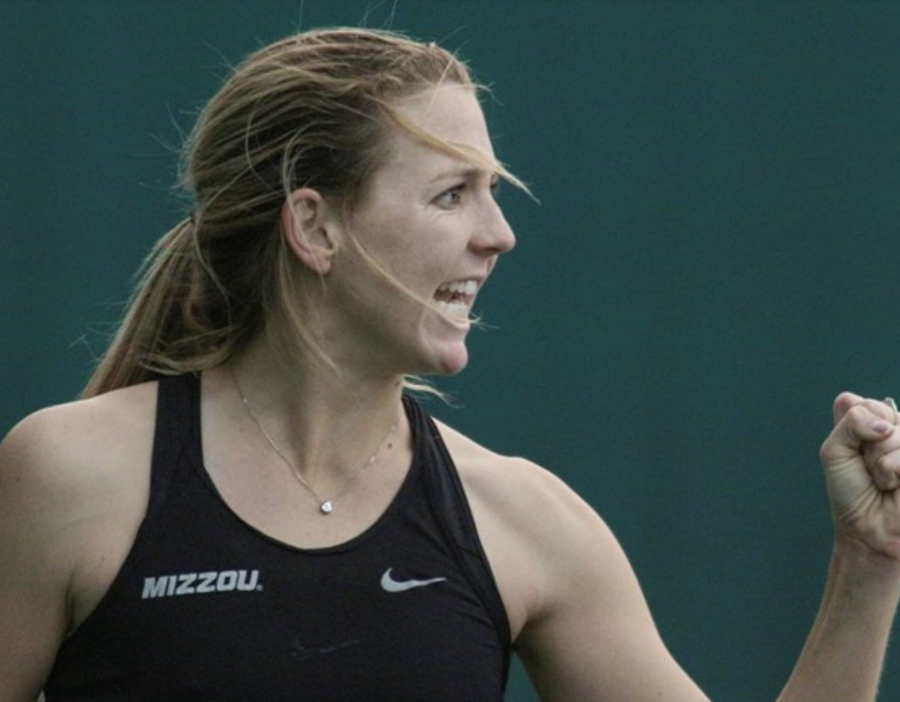
Women’s athletics at the University of Missouri has seen heightened success in recent years. Teams like volleyball, basketball, cross-country and others have ascended the school into what could be considered the golden era of Mizzou women’s sports.
While those programs’ positive results have helped spread the university’s brand across the country, Missouri tennis finds itself in the middle of a stage that brings distaste to coaches, players and fans alike: a rebuild.
The longest-tenured member of that rebuilding team is volunteer assistant coach Cassidy Spearman. After wrapping up her playing career in April following the 2017 spring season, Spearman decided to return to the program she committed to five years ago, despite its recent struggles.
Why invest countless hours in a team she had already sacrificed so much for? For Spearman, the decision was about what the future holds.
“A couple of years ago, I had decided that coaching might be a path I want to pursue for a career, a lifetime career, and when I told [head tennis coach] Colt [Gaston] that, he was kind enough to offer me a position to stay on board and keep coaching,” Spearman said. “Colt’s made this program come such a far way since when he came in, so I just wanted to continue to help him grow.”
Roster turnover is not a trait that most coaches find favorable, but for Spearman, the inexperience has worked to her advantage. Missouri’s eight-player roster features four new faces this season, and it has helped her make the transition from player to coach.
“If I was coaching a lot of my teammates from last year, it would be a harder transition I think just because I was on the team with the girls for three years before, so now coming in, the new girls really saw me as a coach right from the start, so that was awesome,” Spearman said.
Spearman has a lifetime of tennis knowledge. Despite her experience, Spearman knows her limitations. She is leaving the strategy in the hands of her former coach, instead opting to be a resource to her players and provide a unique insight to the daily grind of collegiate tennis.
“For me personally, I’m kind of going to come in and be more like a mentor,” she said. “So I’m going to try and help them through the tough days because I just got out of it. I know what it’s like and I know exactly what they’re going through.”
Spearman’s transition hasn’t come without surprises. She learned how to keep herself in shape for tennis season during her playing career, but she has a newfound appreciation for the work ethic of those who have dedicated their lives to the coaching profession.
“I was shocked honestly at the two different worlds; it is very, very different,” she said. “I guess when you’re a player you’re so wrapped up in just the tennis and the team dynamic and winning matches, but there is a whole other element that I had no idea went into it. I am exhausted at the end of the day and I was just like, ‘Dang, I’m just as tired as if I was a player.’”
Despite some rough results during Gaston’s first year of leadership last season, which included a 2-11 record against Southeastern Conference opponents, Spearman has not lost faith in her former coach. She believes he is the right person to turn the program around.
“He’s grown it so much and the path that he’s on is the path that the program needs to be on,” she said. “He’s going the right way to make this program a top program within the next few years.”
Spearman will look to accelerate the program down Gaston’s path as she continues to soak up knowledge about her newfound profession. For now, she will accept the role of mentor and motivator, providing tough love when it is needed, but before her time in Columbia comes to an end, Spearman hopes to play a vital role in laying a foundation that will send the tennis program into its own golden era sooner rather than later.
_Edited by Eli Lederman | [email protected]_